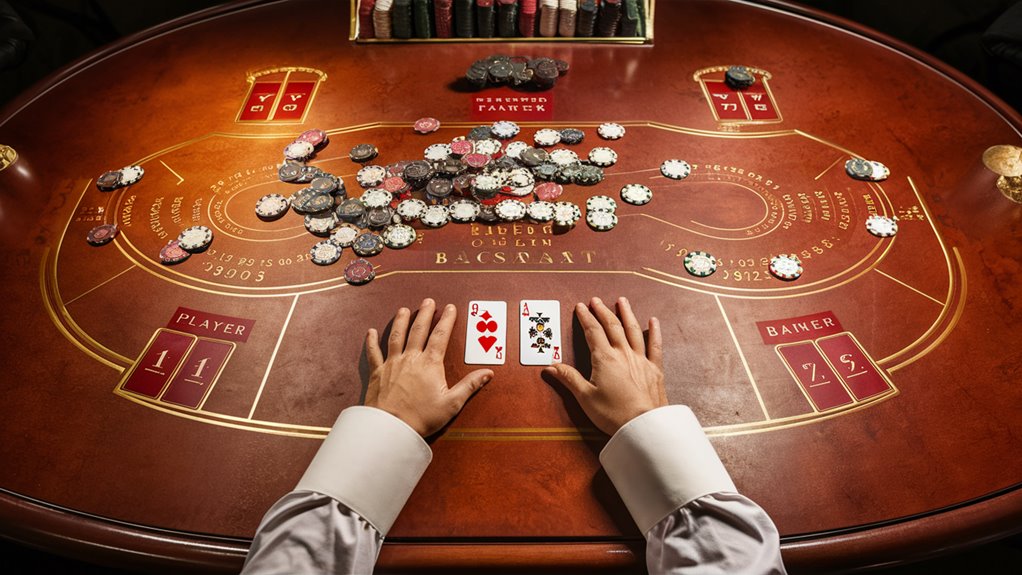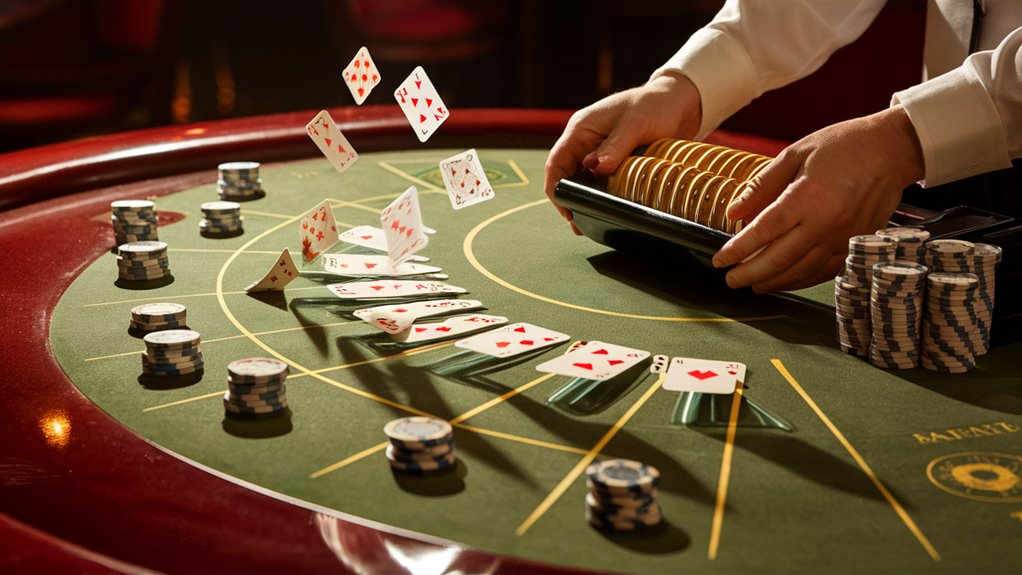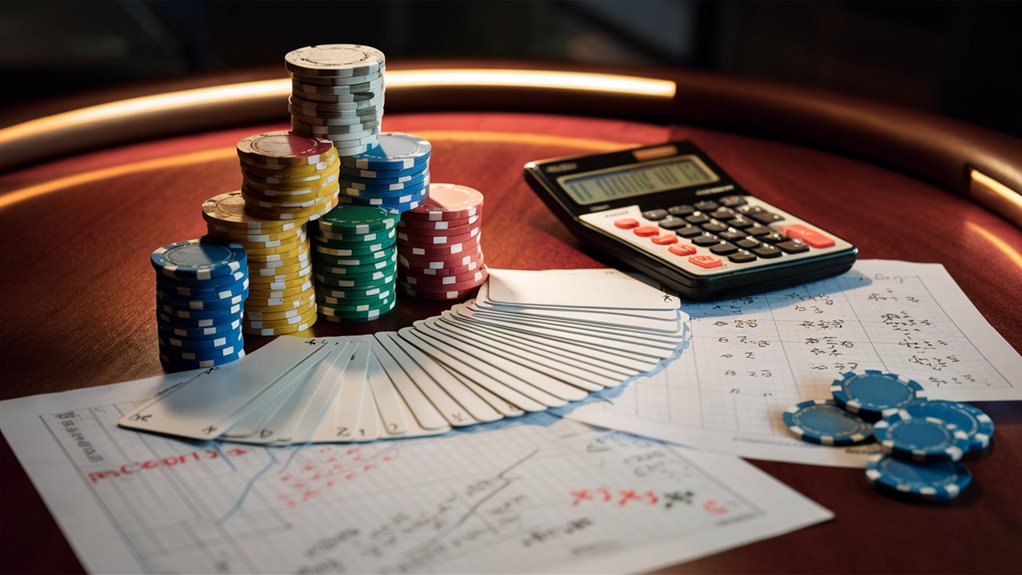The Truth About Baccarat: With Real Cases

Baccarat is one of the games at the casino that many get wrong, even though it has good odds for the player. Tales of big wins by big players and ‘can’t lose’ bet plans get told a lot, but the real math of the game says something else. Seeing the true house edge – just 1.06% on Banker bets – shows why the game draws players and shows its limits. 온카스터디
Knowing Real Baccarat Odds
The pay rules in baccarat are key to the math of the game. When you bet on the Banker hand, which gives the best odds, you must give a 5% fee on bets you win. These rules, along with the set game rules, keep the house edge low but ensure the casino maintains a math edge.
Clearing Up Popular Bet Plans
Many fall for pattern betting and building bets, thinking it can beat the house edge. But cases from the real world always show no bet plan can change the main math of baccarat. Each round is its own thing, not changed by what happened before or any bet plans.
Stat Analysis of Results
Data from lots of games at the casino shows that the Banker hand wins about 45.86% of the time, the Player hand wins 44.62% of games, with ties in 9.52% of rounds. These numbers do not change over many hands, proving the real odds of the game and proving wrong any ideas of sure patterns or “hot” and “cold” tables.
Good play in baccarat comes from knowing and keeping to the game’s fixed odds and real house edge, not from complex bet plans.
Basic Rules and How to Play
Simple Baccarat Rules
Baccarat is one of the easier casino card games to learn. Players pick from three bet choices: Player, Banker, or Tie. After bets are set, the dealer gives two cards each to the Player and Banker spots, aiming for the highest total closest to 9. World-Class Menus for International Visitors
Card Values and Scoring
Card values in baccarat are unique:
- Aces = 1 point
- Cards 2-9 = Face value
- 10s and face cards = 0 points
In working out hand totals, only the last digit counts. For example, if cards add up to 15 (7+8), the true hand value is 5.
Winning Hands and Natural Rules
The spot with a total closest to 9 wins the round. A natural happens if either spot gets an 8 or 9 total from their first two cards. When a natural shows up, no more cards are given.
Rules for the Third Card
If no natural is there, set rules for the third card guide what happens next:
- The Player spot follows clear rules
- The Banker spot has more tricky rules based on:
- The Player’s third card (if there is one)
- Banker’s first total
Explaining Baccarat Math
Understanding House Edge and Odds
Baccarat gives one of the best house edges in casino play, with clear perks across different bet kinds. The Banker bet has a small 1.06% house edge, while the Player bet has a bit higher 1.24% edge. The Tie bet has a big 14.4% house edge, making it a lot less good.
Card Values and Deck Set-Up
The main math of baccarat comes from using an 8-deck shoe with 416 total cards. The firm value system has these rules:
- Aces = 1
- Numbers 2-9 = Face value
- 10s and face cards = 0
Stat Win Rates and Odds
Natural hands (8s and 9s) show up in about 12% of deals, making key choice points. The basic win rates, not counting ties:
- Banker win rate: 50.68%
- Player win rate: 49.32%
If you include tie cases (9.6% odds):
- Banker win rate: 45.85%
- Player win rate: 44.62%
Common Bet Strategies
Known Build-Up Systems

The Martingale System is a well-known bet plan, where players double their bet after each loss. Starting with a $10 base bet, it goes up to $20, $40, and $80 after more losses, aiming to get back past losses while getting a small profit. Trust and Engagement With Customers
Adding-On Bet Ways
The Paroli System uses an adding-on bet way, raising bets after wins not losses. Players often go for three wins in a row before going back to their start bet. Also, the 1-3-2-6 System follows a set bet plan, changing bet sizes based on wins and losses.
Less Risky Bet Ways
The D’Alembert System goes with a more even build-up plan, adding one unit after losses and taking one off after wins. For exact math, the Fibonacci Strategy uses the known number set (1-1-2-3-5-8-13) to work out bet sizes.
Key Points on Risk Control
Doing well with any bet plan needs:
- Setting firm stop-loss limits
- Keeping good control of your betting money
- Knowing the risk and reward of the system
- Following the plan right
Taking Down Common Myths
Knowing Baccarat Odds Myths
Stat independence marks every baccarat hand, no matter what happened before. The true math stays the same: Player hands win 45.86% of the time, while Banker hands win 44.62% of the time. Tracking patterns and guessing results plans are deeply wrong, as each round is its own thing from the last.
Counting Cards in Baccarat: A Real Look
The use of counting cards in baccarat doesn’t work well. Unlike in blackjack, the best edge you can get from it is just 0.7% – a tiny edge given how hard it is. How modern casinos use 6-8 deck shoes and always shuffling machines also stops any real gain. The best plan stays betting on Banker spot, which keeps a 1.06% house edge.
Ending Beliefs in Hot Tables and Bet Plans
The idea of hot tables or due results has no base in math in baccarat. Each round sticks to set odds math, away from earlier results. Well-known bet plans like Martingale and Fibonacci can’t change the built-in house edge. The casino’s math edge is not moved by any bet plans or ways, making such methods not work for a long win run.
Key Odds Facts:
- Banker bet house edge: 1.06%
- Player bet house edge: 1.24%
- Tie bet house edge: 14.36%
Pro Tips and Ways
Better Control of Betting Money
Pro baccarat players use proven plans to lift their win chances. The key to pro play is in tight control of betting money, keeping bets to 2% of all money for one hand. Keeping score stays key for watching bet ways and sorting out results between different ends.
The Best Bet Strategy
Picking the right spot is key in pro baccarat. The Banker spot always offers the best odds with a 1.06% house edge, unlike the Player spot’s 1.24%. Pro players always stay away from the Tie bet due to its high 14.4% house edge. Using clear win-loss rules – like setting profit goals at 20% above your starting money and stop-loss rules at 30% below – makes a plan for long play.
Looking at Fee and Counting Cards
Looking at the fee rate directly changes long-term win chances. The usual 5% fee on Banker wins is best; higher rates hurt your returns. Pro counting cards ways are about watching how many cards are left, as the number left changes the odds and needs changes in how you bet. This top plan helps keep expected value up over many games.


